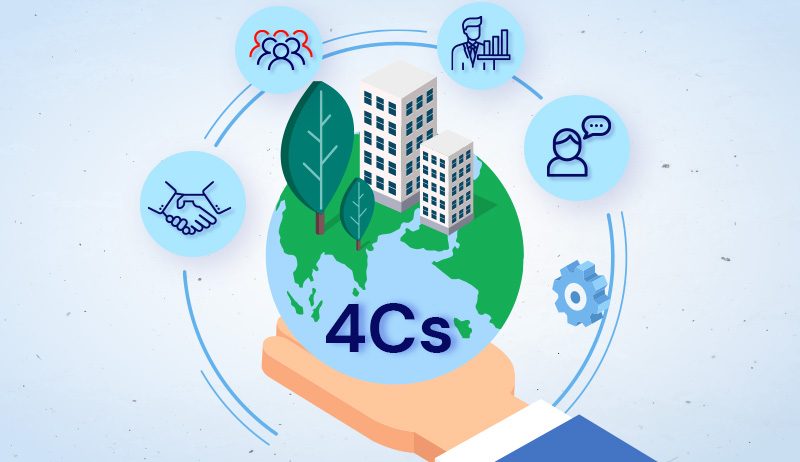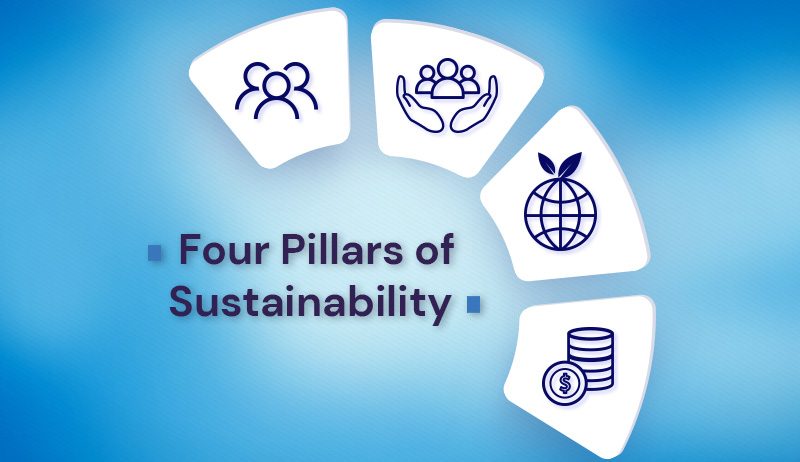In an era where environmental consciousness is essential, understanding sustainability principles becomes crucial for building a greener future.
The 4Cs of Sustainability – Consumption, Conservation, Community, and Cooperation – are the cornerstones of responsible and eco-friendly living.
In this blog, we’ll delve into the 4Cs of sustainability to uncover their significance and explore how they collectively pave the way for a sustainable tomorrow.
What is Sustainability?
Why is Sustainability Important for A Sustainable Future?
Being sustainable is about more than just helping the world. It can also make a business successful. So why is sustainability important?
Many investors use environmental, social, and governance (ESG) metrics to check how ethical and sustainable a company is.
They look at how much carbon a company produces, how it uses water, what it does for the community, and if its board is diverse.
Studies show that companies with good ESG ratings end up paying less for loans and getting more support from investors.
Sustainability efforts can also make a company do better financially and get more support from the public. Companies started being sustainable mainly to match their goals and values, improve their reputation, meet customer expectations, and find new growth opportunities.
Simply put, when a company does good things for the world, it can do well for itself. That’s why many businesses are now adopting sustainable practices. To make your business more sustainable, you can follow these four steps to align your strategy and mission to create shared value.
So What Are the 4Cs of Sustainability?

Consumption: Mindful Living
The Power of Conscious Choices
In a world marked by consumerism, mindful consumption is a game-changer. Discover how conscious choices in what we buy, eat, and use can significantly reduce our carbon footprint.
Learn about sustainable practices and eco-friendly alternatives that promote a healthier planet without compromising lifestyle.
Conservation: Preserving Nature's Gifts
Balancing Act for Biodiversity
Conservation goes beyond saving energy; it’s about preserving biodiversity and natural resources. Explore practical ways to conserve water, energy, and wildlife habitats.
Dive into the importance of sustainable farming practices and how they contribute to preserving the delicate balance of our ecosystems.
Community: Fostering Social Responsibility
Strength in Unity
Sustainability isn’t a solo journey; it’s a collective effort. Delve into the concept of community and how fostering social responsibility creates a ripple effect.
Discover inspiring stories of communities coming together to implement sustainable initiatives, from local clean-up projects to supporting eco-friendly businesses.
Cooperation: Global Solutions for Global Challenges
Collaborating for a Sustainable World
Tackling climate change and promoting sustainability requires global cooperation. Uncover the importance of international collaborations, from government policies to corporate initiatives.
Explore how individuals can contribute to global efforts by supporting international environmental organisations or participating in global sustainability campaigns.
The Four Pillars of Sustainability?

“Sustainability” refers to programs, initiatives, and actions to preserve a specific resource. However, it refers to four distinct areas known as the four pillars of sustainability: human, social, economic, and environmental.
Human Sustainability
Sustainable human development strives to preserve and enhance societal human capital. Initiatives encompassed by human sustainability include investments in healthcare and education systems, ensuring access to services, promoting nutrition, and fostering the acquisition of knowledge and skills.
Given the finite nature of natural resources and available spaces, there is a pressing need to harmonise ongoing growth with advancements in health and the attainment of economic well-being for all.
In a business context, organisations perceive themselves as integral members of society and endorse business values prioritising human capital’s well-being.
Human sustainability underscores the significance of individuals directly or indirectly producing goods, providing services, and the broader spectrum of stakeholders.
Social Sustainability
Social sustainability seeks to safeguard social capital through investments and the establishment of services that form the foundation of our society.
This concept embraces a broader perspective encompassing communities, cultures, and globalisation. Its goal is to ensure the well-being of future generations, recognising that our actions can impact others and the world at large.
Emphasising the maintenance and enhancement of social quality, social sustainability incorporates principles such as cohesion, reciprocity, honesty, and the significance of interpersonal relationships.
Legal frameworks, information dissemination, and the promotion of shared ideals of equality and rights play crucial roles in encouraging and supporting social sustainability.
Aligned with the United Nations’ sustainable development goals, social sustainability embodies the principles of sustainable development, addressing social and economic advancement while safeguarding the environment and promoting equality.
This interconnectedness underscores the mutual dependence of the economy, society, and the ecological system.
Economic sustainability
Economic sustainability strives to preserve capital integrity. While social sustainability enhances social equality, economic sustainability elevates living standards.
It involves effectively utilising assets to ensure sustained company profitability in a business context.
The new economics concept incorporates natural and social capital, challenging the conventional belief that perpetual growth is inherently beneficial and that more prominent is always superior. This perspective questions such notions if they pose potential harm to ecological and human systems.
Environmental sustainability
Environmental sustainability improves human well-being by safeguarding natural capital (land, air, water, minerals). Environmentally sustainable initiatives and programs ensure that the population’s needs are met without jeopardising the needs of future generations.
An ecologically sustainable business strives to integrate all four sustainability pillars, and each must be treated equally to achieve this goal.
What does Sustainability Mean in Business?
An increasing number of enterprises are incorporating sustainability into their business strategies, recognising the potential for success through ethical practices.
According to a recent study, 70 per cent of respondents indicated that their companies had established formal governance for sustainability. However, what is sustainability in business?
In the business context, sustainability entails conducting operations without causing adverse effects on the environment, community, or society.
Sustainability in business typically addresses two primary categories:
- The impact of business activities on the environment.
- The effects of business activities on society.
A sustainable business strategy aims to impact at least one area positively. Failure to assume responsibility can lead to problems such as environmental degradation, inequality, and social injustice.
Businesses committed to sustainability consider a broad spectrum of environmental, economic, and social factors when making decisions.
These organisations actively monitor the consequences of their operations to ensure that short-term profits do not result in long-term liabilities.

Examples of Sustainability in Business
While many successful organisations adopt sustainable business practices, each strategy is unique, aligning with specific business goals and organisational values. For instance, sustainability in business may involve:
- Incorporating sustainable materials in the manufacturing process.
- Streamlining supply chains to minimise greenhouse gas emissions.
- Utilising renewable energy sources to power facilities.
A Call to Action from Cyanergy
In conclusion, embracing the 4Cs of Sustainability is not just a choice; it’s a responsibility we owe to our planet and future generations. Understanding and incorporating these principles into our daily lives can collectively build a greener and more sustainable future.
Are you ready to embark on a journey towards a more sustainable lifestyle? Join us as we collectively build a greener future. Together, let’s pave the way for a future where sustainability is not just a choice but a way of life.
Choose Cyanergy as your renewable energy partner! Contact us Today!







